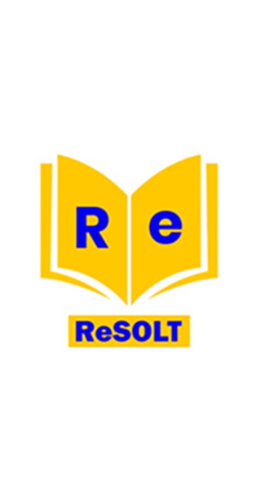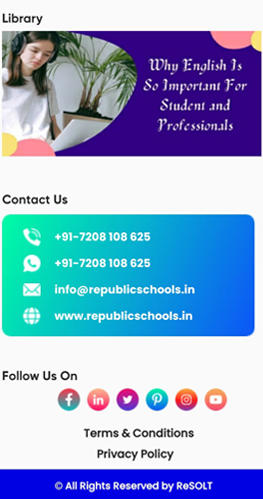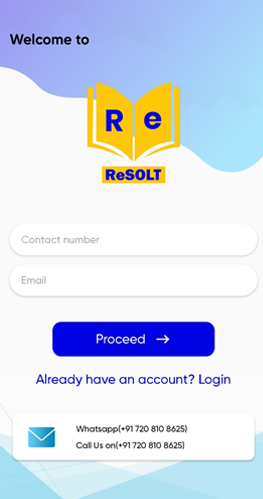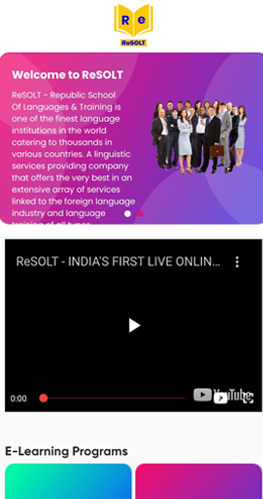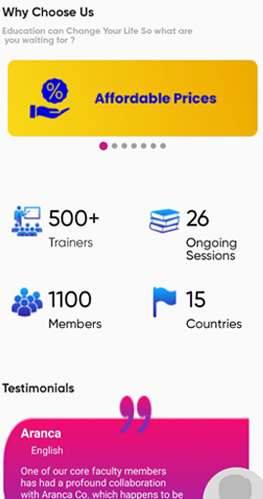Sample Video of Training Session






Courses

Courses

German Classes in Pune
With over 15 million learners worldwide, German has become the first choice of people of all age groups. And, German is among the top 4 foreign languages only behind English, Spanish, and Mandarin these days. In today’s time, it has a whopping 185 million speakers worldwide and it features as an official language in Austria, Switzerland, Germany, Luxembourg, Belgium, and Liechtenstein. With over 100 million native speakers, German (Deutsch) is the most widely spoken language in Europe.
ReSOLT is a reputed German institute in Pune, helping people of all age groups excel in the German language. The institute provides you with innovative and advanced German language courses in Pune that meet your requirements and budgets. Following advanced learning methodology, we offer children, professionals, business owners, and housewives an advanced learning environment to make learning fun all time. We also help them transform their skills and build a strong mental ability to unlock efficiency and scale to meet market demands.
Our language courses and training program are tailored to make you able to acquire a good position in this fast-paced industry. Learn German in Pune with ReSOLT as we offer online German classes in Pune for seamless learning. Regardless of whether you want to improve your German skills for professional or personal reasons, we provide German courses for all levels.
A Brief History And Background Of German Language
As a widely spoken language in Europe, however, German exists in many dialects, most of which belong to either the High German or Low German dialectal groups. The main difference between High and Low German is in the sound system, especially in the consonants. High German, the language of the southern highlands of Germany, is the official written language.Alemannic dialects, which developed in the southwestern part of the Germanic speech area, differ considerably in sound system and grammar from standard High German. These dialects are spoken in Switzerland, western Austria, Swabia, and Liechtenstein and in the Alsace region of France. Yiddish, the language of the Ashkenazic Jews (Jews whose ancestors lived in Germany in the European Middle Ages), also developed from High German.
Benefits of Learning German Language

1. Opens The Door of Opportunities
Many German companies have their offices in various countries including India. A decent knowledge of the German language will help you build a better career with a German company in India or any European country. Germany’s economic strength attracts skilled people from all over the world. Moreover, Germany is the world’s second most popular country after the USA for people looking highest paying jobs. Fluency in German opens the door of opportunities in various industries such as healthcare, education, logistics, media & entertainment, automobile, tourism, information technology, financial services, outsourcing, etc.
2. Germany, India's Leading Economic Partner
Learning German also has its benefits in terms of employment. Germany is the richest country in Europe and maintains a close relationship with India. Germany is the house of the world’s popular brands and companies like BMW, Volkswagen, Bosch, Daimler, Adidas, Allianz, Deutsche Bank, Siemens, SAP, BASF, and Lufthansa. And all these companies are established all over the world, including India. These companies are constantly on the lookout for professionals who speak German and help them to facilitate their integration into the Indian market. You as a German speaker can find an interesting and very well-paid position there.
3. Gateway To World-Class Higher Education
A world-class education is one of the main reasons many students are learning the German language. With so many award-winning scholars from their home country, it comes as no surprise that the German language plays an important role in the academic community. In fact, it ranks second as the most used scientific language. What’s more, the German higher education system boasts various universities,providing courses at minimal tuition fees.
Universities in Germany also offer scholarships for international students. With your German skills, you can easily get admission to a German public university. The degree of German university has an excellent reputation globally, which means you will always be at the forefront in this competitive market.
4. Understand German Opera, Music And Literature
German is the language ofMozart, Goethe,Kafka,Bach, and Beethoven. This European country is also known for its many extremely talented poets, writers, and musicians. Knowing the German language will allow you to fully enjoy the works of the greatest German artists in the original language.
5. Discover Popular Destinations
Learning German will make your vacation extraordinary and unforgettable. With your German-speaking skills, you will be able to travel to Germany or other European countries like Switzerland, Luxembourg, Austria, and even Northern Italy, where you can communicate freely with the locals. It will be a little tricky at first, but you will quickly notice that the Germans are open and friendly.
6. Sharpens Your Mind
While German can be difficult to learn, it’s good for your brain.Bilingual people are considered very smart at work as they can easily switch between two (or more) languages in their everyday speech. Scientific studies have proven that learning a foreign language enhances your cognitive abilities and sharpens your mind.
Levels of German taught at ReSOLT
1. Elementary use of language ( A1 )
Can understand and use familiar, everyday expressions and very simple sentences, which relate to the satisfying of concrete needs. Can introduce him/herself and others as well as ask others about themselves – e.g. where they live, who they know and what they own – and can respond to questions of this nature. Can communicate in a simple manner if the person they are speaking to speaks slowly and clearly and is willing to help.
2. Elementary use of language ( A2 )
Can understand sentences and commonly used expressions associated with topics directly related to his/her direct circumstances (e.g. personal information or information about his/her family, shopping, work, immediate surroundings). Can make him/herself understood in simple, routine situations dealing with a simple and direct exchange of information on familiar and common topics. Can describe his/her background and education, immediate surroundings and other things associated with immediate needs in a simple way.
3. Independent language use ( B1 )
Can understand the main points when clear, standard language is used and the focus is on familiar topics associated with work, school, leisure time, etc. Can deal with most situations typically encountered when travelling in the language region. Can express him/herself simply and coherently regarding familiar topics and areas of personal interest. Can report on experiences and events, describe dreams, hopes and goals as well as make short statements to justify or explain his/her own views and plans.
4. Independent language use ( B2 )
Can understand the main contents of complex texts on concrete and abstract topics; also understands specialized discussions in his/her own primary area of specialization. Can communicate so spontaneously and fluently that a normal conversation with native speakers is easily possible without a great deal of effort on either side. Can express him/herself on a wide range of topics in a clear and detailed manner, explain his/her position on a current issue and indicate the benefits and drawbacks of various options.
5. Autonomous language ability ( C1 )
Can understand a wide range of challenging, longer texts and also grasp implicit meanings. Can express him/herself spontaneously and fluently without having to search for words frequently and noticeably. Can use the language effectively and flexibly in his/her social and professional life or in training and studies. Can make clear, structured and detailed statements on complex topics and apply various means of text association appropriately in the process.
6. Autonomous language ability ( C2 )
Can effortlessly understand practically everything which he/she reads or hears. Can summarize information from various written and spoken sources, logically recounting the reasons and explanations. Can express him/herself spontaneously with high fluency and precision and also make finer nuances of meaning clear in more complex topics.
Foreign Language institute that conducts the exam
Goethe-Institute
The Goethe-Institute , is a non-profit German cultural association operational worldwide with 159 institutes, promoting the study of the German language abroad and encouraging international cultural exchange and relations. Around 246,000 people take part in these German courses per year.The institute has developed a series of exams for learners of German as a foreign language (Deutsch alsFremdsprache, DaF) at all levels: A1 up to C2. These can be taken both in Germany and abroad and have been adapted to fit into the Common European Framework of Reference for Languages (CEFL), the standard for European language testing. There is also one exam, the GroßesDeutschesSprachdiplom, which is at a higher level than the highest CEFL level.[12] Below is a table of the basic Goethe-Institut exams as they fit into the scheme
Time Table
Week Days
| MONDAY | WEDNESDAY | FRIDAY |
|---|---|---|
| 08:30 am to 10:30 am | 08:30 am to 10:30 am | 08:30 am to 10:30 am |
| 10:00 am to 12:00 pm | 10:00 am to 12:00 pm | 10:00 am to 12:00 pm |
| 02:00 pm to 04:30 pm | 12:00 pm to 02:00 pm | 12:00 pm to 02:00 pm |
| 04.00 pm to 06.00 pm | 02.00 pm to 04.00 pm | 02.00 pm to 04.00 pm |
| 06.00 pm to 08.00 pm | 04.00 pm to 06.00 pm | 04.00 pm to 06.00 pm |
| 06.00 pm to 08.00 pm | 06.00 pm to 08.00 pm |
| TUESDAY | THURSDAY | SATURDAY |
|---|---|---|
| 08:30 am to 10:30 am | 08:30 am to 10:30 am | 08:30 am to 10:30 am |
| 10:00 am to 12:00 pm | 10:00 am to 12:00 pm | 10:00 am to 12:00 pm |
| 02:00 pm to 04:30 pm | 12:00 pm to 02:00 pm | 12:00 pm to 02:00 pm |
| 04.00 pm to 06.00 pm | 02.00 pm to 04.00 pm | 02.00 pm to 04.00 pm |
| 06.00 pm to 08.00 pm | 04.00 pm to 06.00 pm | 04.00 pm to 06.00 pm |
| 06.00 pm to 08.00 pm | 06.00 pm to 08.00 pm |
Week Ends
| SATURDAY / SUNDAY | ONLY SATURDAY | ONLY SUNDAY |
|---|---|---|
| 04:00 pm to 07:00 pm | 11:30 am to 02:30 pm | 08:30 am to 10:30 am |
| 06:00 pm to 08:00 pm | 02:30 pm to 05:30 pm | 11:30 am to 02:30 pm |
| 02:30 pm to 05:30 pm |
Time Table
Week Days
| MONDAY | WEDNESDAY | FRIDAY |
|---|---|---|
| 08:30 am to 10:30 am | 08:30 am to 10:30 am | 08:30 am to 10:30 am |
| 10:00 am to 12:00 pm | 10:00 am to 12:00 pm | 10:00 am to 12:00 pm |
| 02:00 pm to 04:30 pm | 12:00 pm to 02:00 pm | 12:00 pm to 02:00 pm |
| 04.00 pm to 06.00 pm | 02.00 pm to 04.00 pm | 02.00 pm to 04.00 pm |
| 06.00 pm to 08.00 pm | 04.00 pm to 06.00 pm | 04.00 pm to 06.00 pm |
| 06.00 pm to 08.00 pm | 06.00 pm to 08.00 pm |
| TUESDAY | THURSDAY | SATURDAY |
|---|---|---|
| 08:30 am to 10:30 am | 08:30 am to 10:30 am | 08:30 am to 10:30 am |
| 10:00 am to 12:00 pm | 10:00 am to 12:00 pm | 10:00 am to 12:00 pm |
| 02:00 pm to 04:30 pm | 12:00 pm to 02:00 pm | 12:00 pm to 02:00 pm |
| 04.00 pm to 06.00 pm | 02.00 pm to 04.00 pm | 02.00 pm to 04.00 pm |
| 06.00 pm to 08.00 pm | 04.00 pm to 06.00 pm | 04.00 pm to 06.00 pm |
| 06.00 pm to 08.00 pm | 06.00 pm to 08.00 pm |
Week Ends
| SATURDAY / SUNDAY | ONLY SATURDAY | ONLY SUNDAY |
|---|---|---|
| 04:00 pm to 07:00 pm | 11:30 am to 02:30 pm | 08:30 am to 10:30 am |
| 06:00 pm to 08:00 pm | 02:30 pm to 05:30 pm | 11:30 am to 02:30 pm |
| 02:30 pm to 05:30 pm |
Duration
| SATURDAY / SUNDAY | ONLY SUNDAY | WEEKDAYS |
|---|---|---|
| 2 Months | 3 Months | 2 Months |
Exam Preparation
We prepare you for Goethe Institute Certification, where you are judged on skills like Listening, Writing ,Hearing & Speaking. We have intermediate and final tests after every course based on
standard exam pattern.
Facilities

World’s Top Trainers

Affordable Fees

Flexible Timings

Live Online Learning

Offline Classes

Personal Attention

Digital Study Material

Creative Exercises

Doubt Solving & Revision

Corporate Training Programs
Follow Us On Social Media














